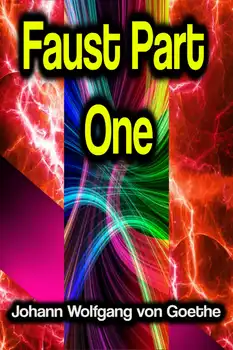Faust Part One - Johann Wolfgang von Goethe - The story of Dr. Faustus and the Devil is one of such deep human significance, and, from the Reformation downwards, of such large European reputation, that in giving some account of its origin, character, treatment, legendary and poetical, I shall seem to be only gratifying a very natural curiosity on the part of the intelligent reader. We, who live in the nineteenth century, in a period of the worlds intellectual development, which may be called the age of spiritual doubt and scepticism, in contradistinction to the age of faith and reverence in things traditional, which was first shaken to its centre by the violent shock of the Reformation, can have little sympathy with the opinions as to spiritual beings, demoniacal agency, magic, and theosophy, that were so universally prevalent in the sixteenth century. We believe in the existence of angels and spirits, because the Scriptures make mention of such spiritual beings; but this belief occupies a place as little prominent in our theology, as its influence is almost null in regard to actual life. In the sixteenth century, however, Demonology and Angelography were sciences of no common importance; and were, too, a fruitful root whence the occult lore of the sages, and the witch, ghost, and magic craft of the many took their rise, and spread themselves out into a tree, whose branches covered the whole earth with their shadow. From the earliest Christian fathers, to the last lingering theosophists of the seventeenth century, we can trace a regular and unshaken system of belief in the existence of infinite demons and angels in immediate connection with this lower world, with whom it was not only possible, but of very frequent occurrence, for men to have familiar intercourse. Psellus,[i1] the prince of philosophers, does not disdain to enter into a detailed account of the nature and influence of demons, and seems to give full faith to the very rankest old wives fables of dæmones incubi et succubi, afterwards so well known in the trials for witchcraft which disgraced the history of criminal law not more than two centuries ago. Giordano Bruno, the poet, the philosopher, and free-thinker of his day, to whom the traditionary doctrines of the Church were as chaff before the wind, was by no means free from the belief in magic, the fixed idea of the age in which he lived. O! quanta virtus, says he, in all the ebullition of his vivid fancy, O quanta virtus est intersectionibus circulorum et quam sensibus hominum occulta!!! cum caput draconis in sagittario exstiterit, diacedio lapide posito in aqua, naturaliter (!) spiritus ad dandum responsa veniunt.[i2] The comprehensive mind of Cornelius Agrippa, the companion of kings and of princes, soon sprung beyond the Cabbalistical and Platonical traditions of his youth; but not less is his famous book De Philosophia Occulta a good specimen of the intellectual character of the age in which he lived. The noted work De Vanitate Scientiarum is a child of Agrippa, not of the sixteenth century. The names of Cardan, Campanella, Reuchlin, Tritheim, Pomponatius, Dardi, Mirandula, and many others, might be added as characteristic children of the same spirit-stirring era; all more or less uniting a strange belief.
Faust: Part One
Essayez 15 heures gratuitement
- Lis et écoute dès aujourd'hui
- Sans engagement, annulez à tout moment

Transforme chaque instant en aventure
- Emportez des centaines de milliers d'histoires directement dans votre poche
- Sans engagement, annulez à tout moment

Commencez ce livre dès aujourd’hui pour 0 €
- Accédez à tous les livres de l'app pendant la période d'essai
- Sans engagement, annulez à tout moment
Auteur(e) :
Langue :
anglais
Format :
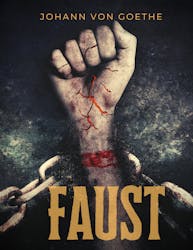
Faust : une pièce de théâtre de Johann Wolfgang von Goethe inspirée de la vie de Johann Georg Faust, alchimiste allemand du xvie siècle
Johann Wolfgang von Goethe
book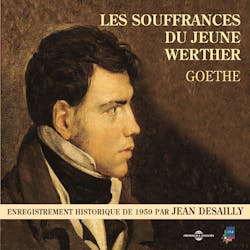
Les souffrances du jeune Werther : Enregistrement historique de 1959
Johann Wolfgang von Goethe
audiobook
Faust : A Timeless Drama of Knowledge, Temptation, and Redemption
Johann Wolfgang von Goethe
book
Johann Wolfgang von Goethe: Faust. Die komplette Hörbuch Edition : Der Tragödier erster und zweiter Teil. Vollständig und ungekürzt vorgetragen.
Johann Wolfgang von Goethe
audiobook
Faust
Johann Wolfgang von Goethe
audiobookbook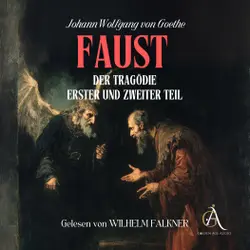
Faust 1 und Faust 2 - Hörbuch Klassiker
Johann Wolfgang von Goethe, Hörbuch Klassiker
audiobook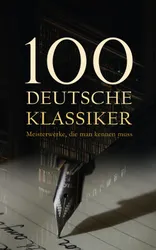
100 Deutsche Klassiker - Meisterwerke, die man kennen muss : Die bahnbrechenden Romane, Erzählungen, Dramen, Aufsätze und Gedichte
Franz Kafka, Johann Wolfgang von Goethe, Theodor Storm, Hugo von Hofmannsthal, Christoph Martin Wieland, E. T. A. A Hoffmann, Gotthold Ephraim Lessing, Frank Wedekind, Gottfried Keller, Theodor Fontane, Clemens Brentano, Achim von Arnim, Jacob Grimm, Wilhelm Grimm, Adelbert von Chamisso, Arthur Schopenhauer, August Klingemann, Novalis, Friedrich Hölderlin, Jean Paul, Gottfried von Straßburg, Sigmund Freud, Elisabeth Langgässer, Gottfried August Bürger, Jakob Michael Reinhold Lenz, Friedrich Gottlieb Klopstock, Wolfram von Eschenbach, Sebastian Brant, Hermann Bote, Hildegard von Bingen, Hans Fallada, Annette von Droste-Hülshoff, Stefan Zweig, Klaus Mann, Hermann Broch, Heinrich Mann, Friedrich Nietzsche, Heinrich Heine, Friedrich Schiller, Robert Musil, Joseph Roth, Heinrich von Kleist, Rainer Maria Rilke, Kurt Tucholsky, Ödön von Horváth, Karl May, Wilhelm Busch, Heinrich Hoffmann, Johanna Spyri, Else Lasker-Schüler, Georg Büchner, Joseph von Eichendorff, Arthur Schnitzler
book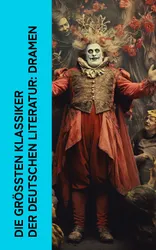
Die größten Klassiker der deutschen Literatur: Dramen : Faust, Die Nibelungen, Don Karlos, Wallenstein, Die letzten Tage der Menschheit, Frühlings Erwachen
Friedrich Schiller, Arthur Schnitzler, Johann Wolfgang von Goethe, Gotthold Ephraim Lessing, Christian Friedrich Hebbel, Karl Kraus, Rainer Maria Rilke, Heinrich von Kleist, Ludwig Tieck, Franz Grillparzer, Ödön von Horváth
book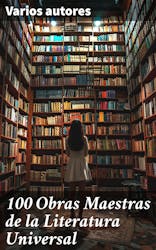
100 Obras Maestras de la Literatura Universal : Explorando la diversidad literaria a lo largo de los siglos
Johann Wolfgang von Goethe, Gustave Flaubert, Franz Kafka, Lewis Carroll, Sigmund Freud, Henrik Ibsen, Charles Dickens, Honoré de Balzac, Mark Twain, Immanuel Kant, Friedrich Schiller, Harriet Beecher Stowe, Oscar Wilde, Robert Louis Stevenson, Edgar Allan Poe, William Shakespeare, Dante Alighieri, Giovanni Boccaccio, Bram Stoker, Charlotte Brontë, Emily Brontë, Jack London, Henry James, Louisa May Alcott, Victor Hugo, Arthur Conan Doyle, Joseph Conrad, Jane Austen, José Rizal, Edgar Rice Burroughs, Herman Melville, Jonathan Swift, Gustavo Adolfo Bécquer, Vicente Blasco Ibáñez, Benito Pérez Galdós, Jean-Jacques Rousseau, Daniel Defoe, Pedro Calderón de la Barca, Virginia Woolf, Washington Irving, Juan Valera, Horacio Quiroga, Nathaniel Hawthorne, Charles Baudelaire, Wilkie Collins, William Makepeace Thackeray, Voltaire, Apuleius, Leopoldo Alas, John Milton, José Martí, Lope de Vega, Emilio Salgari, Francisco de Quevedo, Rubén Darío, Antonio Machado, José Zorrilla, Tirso de Molina, Emilia Pardo Bazán, Fernando de Rojas, L. Frank Baum, H.G. Wells, J.M. Barrie, H. Rider Haggard, H.P. Lovecraft, Seneca, Hans Christian Andersen, Friedrich Nietzsche, Mary Shelley, Baltasar Gracián, Sófocles, Sun Tzu, Fiódor Dostoyevski, Antón Chéjov, León Tolstoi, Tomás Moro, San Agustín, Nikolái Gógol, Julio Verne, Homero, Platón, Alejandro Dumas, Aristóteles, Hermanos Grimm, Jorge Isaacs, Ignacio De Loyola, Nicolás Maquiavelo, Miguel Cervantes, Teresa de Jesús, Alejandro Dumas hijo, Mijaíl Bakunin, Miguel De Unamuno, Duque de Rivas, Ramón María del Valle-Inclán, Federico García Lorca, Gibrán Jalil Gibrán
book
100 Meisterwerke der Weltliteratur - Klassiker die man kennen muss : Ein literarisches Panorama: Meisterwerke, Klassiker und Autoren der Weltliteratur
Johann Wolfgang von Goethe, Jules Verne, Gustave Flaubert, Franz Kafka, Lewis Carroll, Selma Lagerlöf, Sigmund Freud, Johanna Spyri, Theodor Storm, Rainer Maria Rilke, Charles Dickens, Stefan Zweig, Heinrich Heine, Honoré De Balzac, Theodor Fontane, Karl May, Gottfried Keller, Mark Twain, Heinrich Mann, Else Lasker-Schüler, Robert Musil, Walt Whitman, Oscar Wilde, Annette von Droste-Hülshoff, Arthur Schopenhauer, Robert Louis Stevenson, Gustav Freytag, James Fenimore Cooper, Edgar Allan Poe, Heinrich von Kleist, William Shakespeare, Dante Alighieri, Charlotte Brontë, Emily Brontë, Jack London, Arthur Conan Doyle, Joseph Conrad, Jane Austen, Herman Melville, Guy De Maupassant, Walter Scott, Jonathan Swift, Jacob Grimm, Wilhelm Grimm, Alexandre Dumas, Rudyard Kipling, Nathaniel Hawthorne, Homer, O.Henry, Voltaire, Lew Wallace, John Galsworthy, E. T. A. A Hoffmann, Marcus Aurelius, Hans Christian Andersen, Anton Pawlowitsch Tschechow, Platon, Friedrich Nietzsche, Iwan Sergejewitsch Turgenew, Tacitus, Nikolai Gogol, Miguel de Cervantes, Mary Shelley, Thomas Wolfe, Emile Zola, Fjodor Michailowitsch Dostojewski, Leo Tolstoi, Joseph Roth, Joseph von Eichendorff, Kurt Tucholsky, Iwan Alexandrowitsch Gontscharow, Oswald Spengler, Moliere, Alfred Adler, Sophie Laroche, Klaus Mann, Rumi
book
200 Meisterwerke der Literaturgeschichte : Die größten Klassiker der Weltliteratur
Franz Kafka, Victor Hugo, Fjodor Michailowitsch Dostojewski, Lord Byron, Giacomo Leopardi, Marcel Proust, Henrik Ibsen, Percy Bysshe Shelley, Charles Dickens, Jane Austen, Mary Shelley, Emily Brontë, Charlotte Brontë, Anne Brontë, William Makepeace Thackeray, Bram Stoker, Henry Fielding, George Eliot, William Shakespeare, D. H. Lawrence, Walt Whitman, Herman Melville, Thomas Wolfe, Virginia Woolf, Joseph Conrad, Sinclair Lewis, Lewis Carrol, Edgar Allan Poe, Edward Bulwer-Lytton, Oscar Wilde, H.G. Wells, Daniel Defoe, James Fenimore Cooper, Lew Wallace, Jonathan Swift, Robert Louis Stevenson, Mark Twain, Walter Scott, Nathaniel Hawthorne, Harriet Beecher Stowe, Laurence Sterne, Frances Hodgson Burnett, Arthur Conan Doyle, Wilkie Collins, Edgar Wallace, Jack London, Henry David Thoreau, John Galsworthy, F. Scott Fitzgerald, Rudyard Kipling, G.K. Chesterton, Washington Irvin, O.Henry, Ambrose Bierce, Alexander Sergejewitsch Puschkin, Michail Lermontow, Iwan Sergejewitsch Turgenew, Leo Tolstoi, Nikolai Gogol, Iwan Gontscharow, Nikolai Leskow, Anton Pawlowitsch Tschechow, Maxim Gorki, François Rabelais, Jean de la Fontaine, Blaise Pascal, Pierre Corneille, Moliere, Jean Baptiste Racine, Charles Perrault, Voltaire, Denis Diderot, Jean-Jacques Rousseau, Pierre Ambroise de Laclos, Antoine-François Prévost, Marquis De Sade, François René Chateaubriand, Stendhal, Honoré de Balzac, Alexandre Dumas, Alphonse de Lamartine, George Sand, Gustave Flaubert, Emile Zola, Guy De Maupassant, Alphonse Daudet, Jules Verne, Joris-Karl Huysmans, Prosper Mérimée, Charles Baudelaire, Stéphane Mallarmé, Arthur Rimbaud, André Gide, Arthur Schopenhauer, Heinrich Heine, Friedrich Schiller, Johann Wolfgang von Goethe, Jacob Grimm, Gottfried von Straßburg, Wolfram von Eschenbach, E. T. Hoffmann, Annette von Droste-Hülshoff, Heinrich von Kleist, Friedrich Hölderlin, Theodor Fontane, Gustav Freytag, Gottfried Keller, Theodor Storm, Stefan Zweig, Joseph von Eichendorff, Klaus Mann, Rainer Maria Rilke, Johanna Spyri, Joseph Roth, Karl May, Robert Musil, Heinrich Mann, Sigmund Freud, Friedrich Nietzsche, Dante Alighieri, Giovanni Boccaccio, Giacomo Casanova, Luigi Pirandello, Giosuè Carducci, Gabriele D’Annunzio, Niccolo Machiavelli, Miguel Cervantes de Saavedra, Pedro Calderón de la Barca, Vicente Blasco Ibañez, Knut Hamsun, Homer, Äsop, Herodot, Thukydides, Xenophon, Platon, - Aristoteles, - Sophokles, Euripides, - Aristophanes, Lao Tse, - Konfuzius, Siddhartha Gautama Buddha, Titus Livius, Tacitus, Marcus Tullius Cicero, Vergil, Ovid, Lukian, Petronius, Apuleius, Longos von Lesbos, Mark Aurel, Aurelius Augustinus
book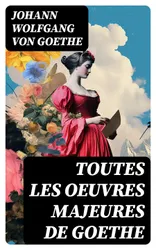
Toutes les Oeuvres Majeures de Goethe
Johann Wolfgang von Goethe
book
